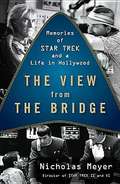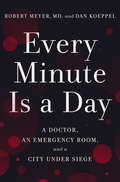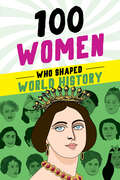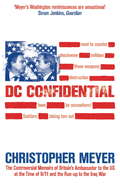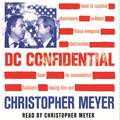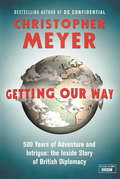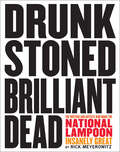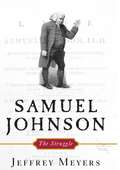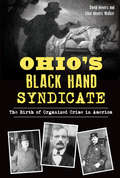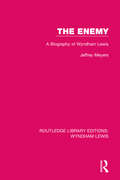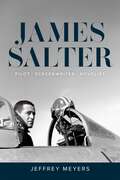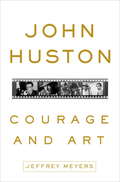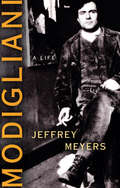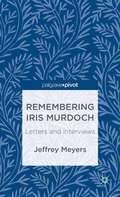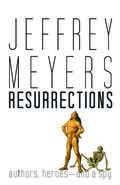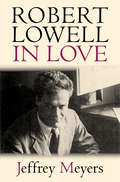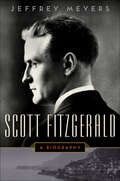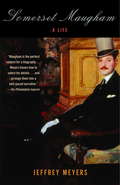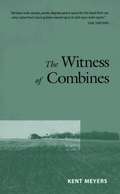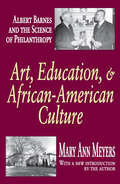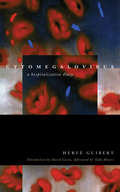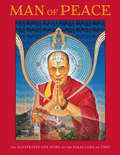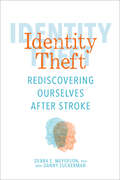- Table View
- List View
The View From the Bridge: Memories of Star Trek and a Life in Hollywood
by Nicholas MeyerThe critically acclaimed director and writer shares his account of the making of the three classic Star Trek filmsThe View from the Bridge is Nicholas Meyer's enormously entertaining account of his involvement with the Star Trek films: STII: The Wrath of Khan, STIV: The Voyage Home, and STVI: The Undiscovered Country, as well as his illustrious career in the movie business. The man best known for bringing together Sherlock Holmes and Sigmund Freud in The Seven Per-Cent Solution had ironically never been interested in Star Trek until he was brought on board to save the film series. Meyer shares how he created the script for The Wrath of Khan, the most revered Star Trek film of all, in twelve days-only to have William Shatner proclaim he hated it. He reveals the death threats he received when word got out that Spock would be killed, and finally answers the long-pondered question of whether Khan's chiseled chest is truly that of Ricardo Montalban. Meyer's reminiscences on everyone from Gene Roddenberry to Laurence Olivier will appeal not only to the countless legions of Trekkies, but to anyone fascinated by the inner workings of Hollywood.
Every Minute Is a Day: A Doctor, an Emergency Room, and a City Under Siege
by Robert Meyer Dan KoeppelAn urgent, on-the-scene account of chaos and compassion on the front lines of ground zero for Covid-19, from a senior doctor at New York City&’s busiest emergency room &“Remarkable and inspiring . . . We&’re lucky to have this vivid firsthand account.&”—A. J. Jacobs, bestselling author of The Year of Living Biblically When former New York Times journalist Dan Koeppel texted his cousin Robert Meyer, a twenty-year veteran of the emergency room at Montefiore Medical Center in the Bronx, at the beginning of the Covid-19 crisis in the United States, he expected to hear that things were hectic. On a scale of 1 to 10, 10 being overwhelmed, where do you think you are? Koeppel asked. Meyer&’s grave reply—100—was merely the cusp of the crisis that would soon touch every part of the globe. In need of an outlet to process the trauma of his working life over the coming months, Meyer continued to update Koeppel with what he&’d seen and whom he&’d treated. The result is an intimate record of historic turmoil and grief from the perspective of a remarkably resilient ER doctor. Every Minute Is a Day takes us into a hospital ravaged by Covid-19 and is filled with the stories of promises made that may be impossible to keep, of life or death choices for patients and their families, and of selflessness on the part of medical professionals who put themselves at incalculable risk. As fast-paced and high-tempo as the ER in which it takes place, Every Minute Is a Day is at its core an incomparable firsthand account of unrelenting compassion, and a reminder that every human life deserves a chance to be saved.
100 Women Who Shaped World History (100 Series)
by Gail Meyer RolkaLearn all about the fascinating lives and tremendous impact of 100 extraordinary women around the world with this fact-filled biography collection for kids. Educational and engaging, 100 Women Who Shaped World History features:Simple, easy-to-read text that has been freshly updatedIllustrated portraits of each figureFascinating facts about famous and lesser-known female figures from historyA timeline, trivia questions, project ideas and more!From Cleopatra to Joan of Arc, Ada Lovelace to Harriet Tubman, Amelia Earhart to Rosa Parks and many more, readers will dive into the lives of 100 female artists, activists, scientists, and icons who left their mark on history. Organized chronologically, this thoroughly researched biography collection offers a look at the contributions these women made and how their talents, discoveries, and ideas have helped guide humanity for thousands of years.
DC Confidential
by Sir Christopher MeyerRiveting and candid memoir of life behind the scenes as US Ambassador and Prime Minister's Press Secretary - a Sunday Times bestsellerChristopher Meyer was Ambassador to the United States from 1997 to 2003, during which time he was an eyewitness to and participant in the events following 9/11 and the preparations for the Iraq war. Never before has there been such a riveting and candid memoir of life behind the diplomatic scenes. Meyer's is an honest account of what he saw, what he heard and how he felt.The cast list of characters who feature here includes Margaret Thatcher, Bob Hope, the Clintons, Steven Spielberg, Condoleeza Rice, Alastair Campbell and Jack Straw. The book reveals close encounters with Tony Blair, Robin Cook and Peter Mandelson; KGB honey traps in Russia; a major row with Bill Clinton; inside stories on Number 10 and the Foreign Office; and of course life behind the scenes with Blair and George W. Bush. It was clear that the Prime Minister's office and not the Foreign Office would control relations with Washington, and Meyer shows in close up how he helped facilitate the 'special relationship'.
DC Confidential
by Sir Christopher MeyerChristopher Meyer was Ambassador to the United States from 1997 to 2003, during which time he was an eyewitness to and participant in the events following 9/11 and the preparations for the Iraq war. Never before has there been such a riveting and candid memoir of life behind the diplomatic scenes. Meyer's is an honest account of what he saw, what he heard and how he felt.The cast list of characters who feature here includes Margaret Thatcher, Bob Hope, the Clintons, Steven Spielberg, Condoleeza Rice, Alastair Campbell and Jack Straw. The book reveals close encounters with Tony Blair, Robin Cook and Peter Mandelson; KGB honey traps in Russia; a major row with Bill Clinton; inside stories on Number 10 and the Foreign Office; and of course life behind the scenes with Blair and George W. Bush. It was clear that the Prime Minister's office and not the Foreign Office would control relations with Washington, and Meyer shows in close up how he helped facilitate the 'special relationship'.Read by Christopher Meyer(p) 2006 Orion Publishing Group
Getting Our Way: 500 Years of Adventure and Intrigue: the Inside Story of British Diplomacy
by Sir Christopher MeyerA highly informed insider's account of some of the 'honest men' as they sought, by fair means or foul, to get Britain its way in the world.GETTING OUR WAY recounts nine stories from Britain's diplomatic annals over the last five hundred years, in which the diplomats themselves are at the centre of the narrative. It is an inside account of their extraordinary experiences, sometimes in the face of physical danger, often at history's hinge. Be it Henry Killigrew's mission to Edinburgh in 1572, Castlereagh at the Congress of Vienna, Our Man in Washington and the Nassau Deal, or the handover of Hong Kong to China, we can see how Britain has viewed its interests in the world and sought to advance them. Some of these dramatic episodes record triumph, some failure, but all of them illustrate how the three pillars of the national interest - security, prosperity and values - have been the foundation of British foreign policy for half a century. Each story is illuminated by colourful anecdotes and insights drawn from Christopher Meyer's first-hand experience of international relations. Moreover, the book is a salutary reminder that foreign policy and diplomacy begin and end with the national interest. And far from being the preserve of aloof aristocrats, the pursuit of our national interest is replete with an extraordinary combination of high principle and low cunning, vice and virtue, all with the specific aim of 'getting our way'.
Drunk Stoned Brilliant Dead: The Writers and Artists Who Made the National Lampoon Insanely Great
by Rick MeyerowitzReprints and reminiscences from the magazine’s first decade: “Fun to flip through . . . Where would American humor be without the National Lampoon?”—The New YorkerFrom its first issue in April 1970, the National Lampoon blazed like a comet, defining comedy as we know it today. To create Drunk Stoned Brilliant Dead, former Lampoon illustrator Rick Meyerowitz selected the funniest material from the magazine and sought out the survivors of its first electrifying decade to gather their most revealing and outrageous stories. The result is a mind-boggling tour through the early days of an institution whose alumni left their fingerprints all over popular culture: Animal House, Caddyshack, Saturday Night Live, Ghostbusters, SCTV, Spinal Tap, In Living Color, Ren & Stimpy, The Simpsons—even Sesame Street counts a few Lampooners among its ranks. This is the story of a band of young talents who “irrevocably rewrote the landscape of American humor” (Publishers Weekly).“A vivid picture of a tight-knit family of twentysomething humorists at the dawn of their careers.” —Newsweek"The other night I started laughing so hard I had to leave the room . . . And then I realized that I hadn’t laughed so hard in 35 years, since I was a teenager, reading National Lampoon.” —The Wall Street Journal“If you grew up with the Lampoon, this book is a trip down memory lane like no other; if not, it will demonstrate that the much maligned 70s could produce humor that has never been surpassed.” —Vanity Fair
Samuel Johnson
by MeyersFord Madox Ford declared Samuel Johnson "the most tragic of all our major literary figures. ” Blessed with a formidable intellect and a burning passion for ideas, Johnson also struggled throughout his life with mental instability and numerous physical defects. One of the most illustrious figures of the English literary tradition, Johnson made his fame as poet, essayist, critic, dictionary-maker, conversationalist, and all-around larger-than-life personality. His success was all the greater for the adversity he had to overcome in achieving it. Drawing on a lifetime of study of Johnson and his era, as well as a wide array of new archival materials, noted biographer Jeffrey Meyers tells the extraordinary story of one of the great geniuses of English letters. Johnson emerges in his portrait as a mass of contradictions: lazy and energetic, aggressive and tender, melancholy and witty, comforted yet tormented by religion. He was physically repulsive and slovenly in dress and habits, but his social ideas were progressive and humane--he strongly opposed slavery and the imperial exploitation of indigenous peoples. He gave generously to the poor and homeless, rescued prostitutes, and defended criminals who’d been condemned to hang. But these charitable acts could not dispel the darkness that clouded his world: overwhelming guilt and fear of eternal damnation. A masterful portrait of a brilliant and tormented figure, this book reintroduces a new generation of readers to the heroic Dr. Johnson.
Ohio's Black Hand Syndicate: The Birth of Organized Crime in America (True Crime)
by David Meyers Elise Meyers WalkerOrganized crime was born in the back of a fruit store in Marion. Before America saw headlines about the Capone Mob, the Purple Gang and Murder Inc., the specter of the Black Hand terrorized nearly every major city.Fears that the Mafia had reached our shores and infiltrated every Italian immigrant community kept police alert and citizens on edge. It was only a matter of time before these professed Robin Hoods formed a band. And when they did, the eyes of the world turned to Ohio, particularly when the local Black Hand outfit known as the Society of the Banana went on trial. Authors David Meyers and Elise Meyers Walker unfold this first and nearly forgotten chapter on crime syndicate history.
Edmund Wilson: A Biography
by Jeffrey MeyersFrom the book: "This first life of Edmund Wilson completes my trilogy on modern American writers that began with the biographies of Hemingway and Fitzgerald. ...Wilson, whom Gore Vidal called "America's best mind," also had extraordinarily wide interests and ranged far beyond literature. He wrote about art, theater, music, film, popular culture as well as political events, foreign travel, the revolutionary tradition in Europe, the Dead Sea Scrolls, the Zuni and Iroquois Indians, the American Civil War, the culture and politics of Canada. He was the master of the biographical essay and the autobiographical memoir, and was the greatest diarist of his time."
The Enemy: A Biography of Wyndham Lewis (Routledge Library Editions: Wyndham Lewis #1)
by Jeffrey MeyersOriginally published in 1980 and nominated for the Duff Cooper Prize, this was the first biography of Wyndham Lewis and was based on extensive archival research and interviews. It narrates Lewis’ years at Rugby and the Slade, his bohemian life on the Continent, the creation of Vorticism and publication of Blast, and his experiences at Passchendaele, as well as his many love affairs, his bitter quarrels with Bloomsbury and the Sitwells, the suppressed books of the thirties, the evolution of his political ideas, his self-imposed exile in North America and creative resurgence during his final blindness. Jeffrey Meyers also describes Lewis’ relationships with Roy Campbell, D. H. Lawrence, Katherine Mansfield, T. E Lawrence, Hemingway, Huxley, Yeats, Auden, Spender, Orwell and McLuhan. As the self-styled Enemy emerges from the shadows, he is seen as an independent and courageous artist and one of the most controversial and stimulating figures in modern English art and literature.
James Salter: Pilot, Screenwriter, Novelist
by Jeffrey MeyersBiographer and critic Jeffrey Meyers knew the novelist James Salter (1925–2015) during the last decade of his life, visited him twice on Long Island, and received eighty letters from him. Meyers’s knowledge of Salter’s life provides many new insights about the personal, literary, and historical background of his work. This appreciative book, the first full-length study in twenty-six years, is intended to introduce Salter to new readers and show his achievement as a writer of novels, stories, screenplays, memoirs, and travel essays. Salter had an extraordinary range of experience as West Point graduate; fighter pilot in the Korean War; downhill skier, rock climber, and mountain climber; screenwriter and film director; connoisseur of food and wine; world traveler and sophisticated observer. In an elegant blend of literary criticism and intimate memoir, with crisp prose and an eye for telling detail, Meyers discusses Salter’s family and friends; the significance of his book and chapter titles; characters’ names and cultural allusions; literary influences, especially Ernest Hemingway and F. Scott Fitzgerald; development of his fictional style and techniques; awareness of weather and light; supreme delineation of sexual ecstasy; recurrent themes of war and love; strange career and late recognition. A detailed chronology tracks the key dates and events in Salter’s life, and a chronological bibliography shows the development of his literary reputation. For Meyers, Salter’s lyrical evocation of people and places, of luxurious decadence and the danger of death, are unsurpassed in contemporary literature. This book appears just before the centenary of Salter’s birth.
John Huston: Courage and Art
by Jeffrey MeyersFrom the acclaimed biographer of Ernest Hemingway, Humphrey Bogart, and Errol Flynn comes the first complete biography of the legendary John Huston, the extraordinary director, writer, actor, and bon vivant who made iconic films such as The Maltese Falcon, The Treasure of the Sierra Madre, The Asphalt Jungle, and The African Queen--and lived one of the most vibrant, eventful lives in Hollywood history. An actor in the 1920s and scriptwriter in the 1930s, John Huston made his dazzling directorial debut in 1941 with The Maltese Falcon. His career as a filmmaker spanned some fifty-seven years and yielded thirty-seven feature films. He made most of his movies abroad, spent much of his life in Ireland and Mexico, and remains one of the most intelligent and influential filmmakers in history. With equal attention given to Huston's impressive artistic output and tempestuous personal relationships, biographer Jeffrey Meyers presents a vivid narrative of Huston's remarkably rich creative life. The son of the famous stage and screen actor Walter Huston, John Huston was born in Nevada City, Missouri, and suffered from a weak heart that forced him to live as an invalid for much of his childhood. One day, however, he impulsively left his sickbed, dove over a waterfall, swam into a raging river and began to lead a strenuous life. He became an expert sportsman as well as a boxer, bullfighter, hunter, soldier, gambler and adventurer. Though he didn't finish high school, he was a man of true genius: a serious painter and amusing raconteur, playwright and story writer, stage and screen actor, director of plays on Broadway and operas at La Scala, autobiographer and political activist who crusaded against Senator Joseph McCarthy's anticommunist witch hunts in Hollywood. He was a discerning collector of art and connoisseur of literature, food and wine. Passionate about horses and women, he had five successively younger wives. Meyers chronicles Huston's extraordinarily peripatetic life and examines his rise as a great masculine artist in the formidable tradition of Melville, Conrad and Hemingway, whose persona, ethos, prose style and virile code had a powerful influence on his life and work. Thirty-four of Huston's thirty-seven films adapted important novels, stories and plays, and Meyers perceptively describes how Huston brilliantly transformed the written word into the cinematic image. Huston's dominant theme is the almost impossible quest, tempered by detachment and irony. His heroes sacrifice honor in pursuit of wealth but fail in that venture, are mocked by cruel fate and remain defiant in the face of defeat. Based on research in Huston's personal and professional archives, and interviews with his children, friends and colleagues, this is the dramatic story of a courageous artist who, Meyers persuasively argues, is "one of the most fascinating men who ever lived."From the Hardcover edition.
Modigliani: A Life
by Jeffrey MeyersIn 1920, at the age of thirty-five, Amedeo Modigliani died in poverty and neglect in Paris, much like a figure out of La Bohéme. His life had been as dramatic as his death. An Italian Jew from a bourgeois family, "Modi" had a weakness for drink, hashish, and the many women-including the Russian poet Anna Akhmatova-who were drawn to his good looks. His friends included Picasso, Utrillo, Soutine, and other important artists of his day, yet his own work stood apart, generating little interest while he lived. Today's art world, however, acknowledges him as a master whose limited oeuvre-sculptures, portraits, and some of the most appealing nudes in the whole of modern art-cannot satisfy collectors' demand. With a lively but judicious hand, biographer Jeffrey Meyers sketches Modigliani and the art he produced, illuminating not only this little-known figure but also the painters, writers, lovers, and others who inhabited early twentieth-century Paris with him.
Remembering Iris Murdoch: Letters and Interviews
by Jeffrey MeyersThis annotated edition of the unpublished letters that Iris Murdoch wrote to Jeffrey Meyers includes her discussion of writers from Conrad to Updike; her quarrel with Rebecca West; and her difficulty with Alzheimer's. With both scholarly insight and personal reflection, this volume will deepen our understanding of Murdoch's complex life and work.
Resurrections: Authors, Heroes—and a Spy
by Jeffrey MeyersJeffrey Meyers’ Resurrections: Authors, Heroes—and a Spy brings to life a set of extraordinary writers, painters, and literary adventurers who turned their lives into art. Meyers knew nine of these figures, in some cases intimately, while five others he admires and regrets never meeting. As he writes in the preface, "The chapters in this book represent in miniature my career as a life-writer. My biographies have always been driven by fascination with the source of artistic creativity, with people who wrote or painted and with the worlds they inhabited." Ian Watt, who taught Meyers at Berkeley, struggled with the legacy of his ordeal as a Japanese prisoner of war, and with its depiction in the film, The Bridge on the River Kwai. The story of Paul Theroux’s feud with Sir Vidia Naipaul is well known, but Meyers finds greater meaning in their quarrel through the lens of his own long friendship with Theroux. While James Salter, fighter pilot and brilliant stylist, epitomizes Meyers’ heroic ideal, the fiction writer also responds with an epistolary friendship, punctuated by visits, and Meyers is delighted by Salter’s great reputation late in life. Anthony Blunt, art historian and communist spy, fascinates the biographer for a darker reason: the depth of his capacity for intellectual and personal deceit. The feckless, lesser-known Hugh Gordon Porteus, told Meyers many revealing and amusing stories about his friends Wyndham Lewis, T. S. Eliot and Ezra Pound. In the process of writing these profiles, Meyers discovers a common thread relating to himself: not only do these subjects provoke a kind of personal testing, they also represent his search for the ideal father in his vivid intellectual and imaginative inquiry.
Robert Lowell in Love
by Jeffrey MeyersRobert Lowell was known not only as a great poet but also as a writer whose devotion to his art came at a tremendous personal cost. In this book, his third on Robert Lowell, Jeffrey Meyers examines the poet’s impassioned, troubled relationships with the key women in his life: his mother, Charlotte Winslow Lowell; his three wives—Jean Stafford, Elizabeth Hardwick, and Caroline Blackwood; nine of his many lovers; his close women friends—Mary McCarthy, Elizabeth Bishop, and Adrienne Rich; and his most talented students, Anne Sexton and Sylvia Plath. Lowell’s charismatic personality, compelling poetry, and literary fame attracted lovers and friends who were both frightened and excited by his aura of brilliance and danger. He loved the idea of falling in love, and in his recurring manic episodes he needed women at the center of his emotional and artistic life. Each affair became an intense dramatic episode. Though he idealized his loves and encouraged their talents, his frenetic affairs and tortured marriages were always conducted on his own terms. Robert Lowell in Love tells the story of the poet in the grip of love and gives voice to the women who loved him, inspired his poetry, and suffered along with him.
Samuel Johnson
by Jeffrey MeyersFord Madox Ford declared Samuel Johnson "the most tragic of all our major literary figures." Blessed with a formidable intellect and a burning passion for ideas, Johnson also struggled throughout his life with mental instability and numerous physical defects. One of the most illustrious figures of the English literary tradition, Johnson made his fame as poet, essayist, critic, dictionary-maker, conversationalist, and all-around larger-than-life personality. His success was all the greater for the adversity he had to overcome in achieving it.Drawing on a lifetime of study of Johnson and his era, as well as a wide array of new archival materials, noted biographer Jeffrey Meyers tells the extraordinary story of one of the great geniuses of English letters. Johnson emerges in his portrait as a mass of contradictions: lazy and energetic, aggressive and tender, melancholy and witty, comforted yet tormented by religion. He was physically repulsive and slovenly in dress and habits, but his social ideas were progressive and humane-he strongly opposed slavery and the imperial exploitation of indigenous peoples. He gave generously to the poor and homeless, rescued prostitutes, and defended criminals who'd been condemned to hang. But these charitable acts could not dispel the darkness that clouded his world: overwhelming guilt and fear of eternal damnation.A masterful portrait of a brilliant and tormented figure, this book reintroduces a new generation of readers to the heroic Dr. Johnson.
Scott Fitzgerald: A Biography
by Jeffrey MeyersScott Fitzgerald, a romantic and tragic figure who embodied the decades between the two world wars, was a writer who took his material almost entirely from his life. Despite his early success with The Great Gatsby, Fitzgerald battled against failure and disappointment. This book, by the acclaimed biographer of Hemingway, is the first to analyze frankly the meaning as well as the events of Fitzgerald's life and to illuminate the recurrent patterns that reveal his inner self. Meyers emphasizes Fitzgerald's alcoholism, Zelda's illnesses and her doctors, Fitzgerald's love affairs both before and after her breakdown, and his wide-ranging friendships, from the polo star Tommy Hitchcock to the Hollywood executive Irving Thalberg. His writer friends included Ring Lardner, John Dos Passos, James Joyce, Edith Wharton, and Dorothy Parker. His friend and lifelong hero, Ernest Hemingway, was a harsh critic of both his behavior and his novels, but Fitzgerald accepted this with remarkable humility. Meyers portrays the volatile connection between these two writers and Fitzgerald's marriage to the schizophrenic Zelda with insight and poignancy. Meyers also discusses Fitzgerald's fascinating relationship with his daughter, Scottie. Exercising a fine critical balance, he details Fitzgerald's weaknesses but ultimately reveals a man capable of fierce loyalty and great moral courage.
Somerset Maugham: A Life
by Jeffrey MeyersA frequent biographer, Meyers plies his trade on British writer Maugham (1874-1965). Among the little known details revealed are his days at Hiedelberg and on Capri, his medical training, his wartime espionage, his quarrels and friendships, and his love affairs and committed relationships. Annotation ©2004 Book News, Inc. , Portland, OR (booknews. com)
The Witness of Combines
by Kent MeyersThe author recounts the wake of his father's death when he was sixteen and reflects on families, farms, and rural life in the Midwest. His perspective on rural life in the Midwest elegantly weaves daily farm life with his own coming of age story, drawing readers from all walks of life into this brave and poignant work.
Art, Education, and African-American Culture: Albert Barnes and the Science of Philanthropy
by Mary Ann MeyersA physician who applied his knowledge of chemistry to the manufacture of a widely used antiseptic, Albert Barnes is best remembered as one of the great American art collectors. The Barnes Foundation, which houses his treasures, is a fabled repository of Impressionist, post-Impressionist, and early modern paintings. Less well known is the fact that Barnes attributed his passion for collecting art to his youthful experience of African-American culture, especially music. Art, Education, and African-American Culture is both a biography of an iconoclastic and innovative figure and a study of the often-conflicted efforts of an emergent liberalism to seek out and showcase African American contributions to the American aesthetic tradition.Mary Ann Meyers examines Barnes's background and career and the development and evolution of his enthusiasm for collecting pictures and sculpture. She shows how Barnes's commitment to breaking down invidious distinctions and his use of the uniquely arranged works in his collection as textbooks for his school, created a milieu where masterpieces of European and American late-nineteenth and early-twentieth century painting, along with rare and beautiful African art objects, became a backdrop for endless feuding. A gallery requiring renovation, a trust prohibiting the loan or sale of a single picture, and the efforts of Lincoln University, known as the "black Princeton," to balance conflicting needs and obligations all conspired to create a legacy of legal entanglement and disputes that remain in contention.This volume is neither an idealized account of a quixotic do-gooder nor is it a critique of a crank. While fully documenting Barnes's notorious eccentricities along with the clashing interests of the main personalities associated with his Foundation, Meyers eschews moral posturing in favor of a rich mosaic of peoples and institutions that illustrate many of the larger themes of American culture in general and African-American culture in particular.
Cytomegalovirus: A Hospitalization Diary
by Todd Meyers Hervé Guibert David Caron Clara OrbanBy the time of his death, Herve Guibert had become a singular literary voice on the impact of AIDS in France. He was prolific. His oeuvre contained some twenty novels, including To the Friend Who Did Not Save My Life and The Compassion Protocol. He was thirty-six years old. In Cytomegalovirus, Guibert offers an autobiographical narrative of the everyday moments of his hospitalization because of complications of AIDS. Cytomegalovirus is spare, biting, and anguished. Guibert writes through the minutiae of living and of death—as a quality of invention, of melancholy, of small victories in the face of greater threats—at the moment when his sight (and life) is eclipsed. This new edition includes an Introduction and Afterword contextualizing Guibert’s work within the history of the AIDS pandemic, its relevance in the contemporary moment, and the importance of understanding the quotidian aspects of terminal illness.
Man of Peace: The illustrated life story of the Dalai Lama of Tibet
by William Meyers Robert A.F. Thurman Michael G. BurbankWhy the "life story" of the Dalai Lama? It is a story of one man taking on an empire, calling for truth, peace, and justice for his Tibetan people. Here, in full color for the first time, people can come to know the whole drama of his lifelong struggle. Since the age of 15, the Dalai Lama has defended his people against one of the last great empires, the People&’s Republic of China. Under its "dictatorship of the proletariat," China began to invade Tibet in 1950, decimating and then continually oppressing its people. Since colonialism cannot be practiced in our era of self-determined nations, China always maintains that the Tibetans are a type of Chinese, using propaganda and military power to crush Tibet&’s unique culture and identity. Yet the Dalai Lama resists by using only the weapon of truth—along with resolute nonviolence—even worrying some of his own people by seeking dialogue and reconciliation based on his more realistic vision. The great 14th Dalai Lama of Tibet has become the first global Dalai Lama, a prominent transnational leader of all who want to make the dramatic changes actually necessary for life on earth to thrive for centuries to come. Considered the incarnation of the Buddhist savior Chenrezig or Avalokiteshvara—archangel of universal compassion—he is believed to appear in many forms, at many different times, whenever and wherever beings suffer. Representing the plight of his beloved Tibetan people to the world, he has also engaged with all people who suffer oppression and injustice, as recognized in 1989 by his being awarded the Nobel Peace Prize. Most importantly, the Dalai Lama walks his talk throughout these pages, as he has throughout his life, and he radiates a powerful hope that we can and will prevail. Man of Peace presents the inside story of his amazing life and vision, in the high tension of the military occupation of Tibet and the ongoing genocide of its people—a moving work of political and historical nonfiction brought to life in the graphic novel form—here for all to see.
Identity Theft: Rediscovering Ourselves After Stroke
by Debra Meyerson Danny ZuckermanWinner of the 2019 Silver Nautilus Book Award, Identity Theft centers on Debra&’s experience: her stroke, her extraordinary efforts to recover, and her journey to redefine herself. But she also draws on her skills as a social scientist, sharing stories from several dozen fellow survivors, family members, friends, colleagues, therapists, and doctors she has met and interviewed. By sharing this diversity of experiences, Debra highlights how every person is different, every stroke is different, and every recovery is different. She provides a valuable look at the broad possibilities for successfully navigating the challenging physical recovery—and the equally difficult emotional journey toward rebuilding one&’s identity and a rewarding life after a trauma like stroke.
